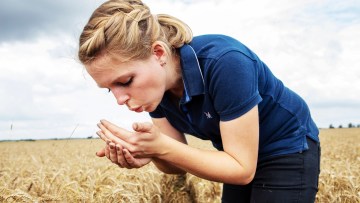RevYstories: Hannah Darby
02.05.2022

About Hannah
Hannah is a fourth-generation farmer on the family farm, Roughs Farm near Huntingdon in Cambridgeshire. Farming was not Hannah’s first career however, as prior to undertaking a Masters in arable crop management at Writtle College, she had been a physiotherapist, returning to the farm full-time just over two years ago.
There are 3 farms in the 360 ha business, which is in one of the driest parts of the country receiving about 450 mm of rain annually. The cropping consists of winter and spring wheat, spring oats, spring barley, spring peas, spring beans and sugar beet with 25 ha of Stewardship and land let for potatoes.
The majority of the farm is on the Fen with black organic soil which is very prone to wind erosion. Cover crops are grown to stop the soil blowing away.
Black soils are very rich in nitrogen, ensuring plants get as much nitrogen as they need, the consequence of this is poor rooting. Hannah said, “When we don’t get rain it is a bit of a double whammy as there isn’t the root system there to find any water that is available. Our number one goal is to get the roots down as deep as we can in the winter.”
When it comes to wheat establishment, Hannah makes assessments on a field by field basis, although in the main establishment is done by direct drilling.
Blackgrass is a traditional problem weed but wild oats are becoming more of an issue. Hannah sends samples of both these weeds for laboratory testing to see how much herbicide resistance is present. Hannah is very keen on the technological aspect of farming and introduced guidance and yield mapping early on when she came back to the farm.
Two of three farms are in the second year of a Stewardship Scheme, with the third in the application process.
Hannah said, “It is really important to me that we look after the soil not only because that’s what makes us profitable but also, it is what we will be passing on to future generations and likewise, the things that we are doing with environmental stewardship will benefit future generations.”

Hannah's RevYstory
Hannah joined Real Results in 2019, with a keen desire to drill down into the detail so she can improve her performance. She said, “I like to try things out, and what Real Results offers, through ADAS’ Agronomics approach, is to get more data about how crops perform in our unique environment – that’s really appealing for us.”
Monitoring disease, in particular Septoria, is something Hannah has been looking at closely. She said: “Our 2019 Curacrop result [BASF leaf monitoring for latent Septoria] was one aspect that surprised us – we had latent Septoria in leaves that appeared completely free of disease when we took the samples.”
Last year, Hannah’s trial was in a field of LG Skyscraper, and used an application of Revystar® XE 1 litre/ha at T2. The T1 application was the same across all trials.
The Revystar® XE treated area yielded 12.17 t/ha, giving a 0.25t/ha benefit compared to the farm standard.
For Hannah, her trial was more than just about fungicide choice. She is determined to get more for the soils so she can continue to push yield. Hannah said: “Of course we want to maximise profitability, but we also want to be sure the way we’re farming is sustainable, especially on these high carbon soils and with so much pressure to restore peatlands. With the right management we can cultivate a high yielding crop and feed the carbon cycle.”
